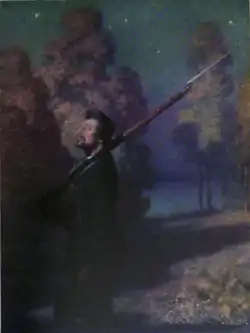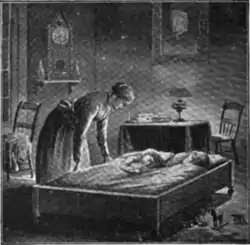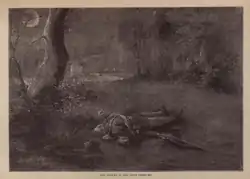All Quiet Along the Potomac
All Quiet Along the Potomac Tonight („alles ruhig am Potomac heute Nacht“) ist ein US-amerikanisches Gedicht und Lied aus dem Sezessionskrieg, welches ursprünglich als „The Picket Guard“ („Der Feldposten“) von Ethel Lynn Beers veröffentlicht wurde.
In dieser ersten Fassung erschien es am 30. November 1861 in der Zeitung „Harper’s Weekly“, als Autor wurden nur die Initialen „E.B.“ angegeben. Erst am 4. Juli 1863 teilte die Zeitung ihren Lesern mit, wer sich dahinter verbarg. Beers soll die Idee für das Gedicht bekommen haben, als sie an einem Septembermorgen im Jahr 1861 die Mitteilung „all is quiet tonight“ ("alles ist ruhig heute Nacht") in der Zeitung las, ein Ausspruch aus einem offiziellen Telegramm, das General George B. McClellan nach der Schlacht am Bull Run an den Verteidigungsminister sendete. Nachfolgend wurde in der Zeitung in einem kleinen Artikel erwähnt, dass in der gleichen Nacht ein Feldposten getötet wurde. Noch am selben Morgen schrieb Beers das Gedicht zu Ende. Darin beklagt sie die Meldung, alles sei ruhig gewesen in dieser Nacht, obwohl ein Feldposten sein Leben lassen musste.
Der Text wird oftmals auch Lamar Fontaine zugeschrieben, dies gilt aber als sehr umstritten.
1863 vertonte John Hill Hewitt, selbst Dichter, Journalist, Musiker und Soldat der Konföderierten, das Gedicht.
Das Lied inspirierte wahrscheinlich die Titelgebung der englischen Übersetzung des Romans "Im Westen nichts Neues" ("All Quiet on the Western Front") von Erich Maria Remarque.
Text

"The Picket-Guard", Harper’s Weekly, 1861:
- "All quiet along the Potomac," they say,
- "Except now and then a stray picket
- Is shot, as he walks on his beat, to and fro,
- By a rifleman hid in the thicket.
- 'T is nothing–a private or two, now and then,
- Will not count in the news of the battle;
- Not an officer lost–only one of the men,
- Moaning out, all alone, the death rattle."
- All quiet along the Potomac to-night,
- Where the soldiers lie peacefully dreaming;
- Their tents in the rays of the clear autumn moon,
- Or the light of the watch-fires, are gleaming.
- A tremulous sigh, as the gentle night wind
- Through the forest leaves softly is creeping;
- While stars up above, with their glittering eyes,
- Keep guard–for the army is sleeping.

- There's only the sound of the lone sentry's tread
- As he tramps from the rock to the fountain,
- And he thinks of the two in the low trundle-bed,
- Far away in the cot on the mountain.
- His musket falls slack; his face, dark and grim,
- Grows gentle with memories tender,
- As he mutters a prayer for the children asleep,
- For their mother,–may Heaven defend her!
- The moon seems to shine just as brightly as then,
- That night when the love yet unspoken
- Leaped up to his lips–when low, murmured vows
- Were pledged to be ever unbroken;
- Then drawing his sleeve roughly over his eyes,
- He dashes off tears that are welling,
- And gathers his gun closer up to its place,
- As if to keep down the heart-swelling.
- He passes the fountain, the blasted pine tree,–
- The footstep is lagging and weary;
- Yet onward he goes, through the broad belt of light,
- Toward the shade of the forest so dreary.

- Hark! was it the night wind that rustled the leaves?
- Was it moonlight so wondrously flashing?
- It looked like a rifle–"Ha! Mary, good-by!"
- And the life-blood is ebbing and plashing.
- All quiet along the Potomac to-night,–
- No sound save the rush of the river;
- While soft falls the dew on the face of the dead,–
- The picket's off duty forever.